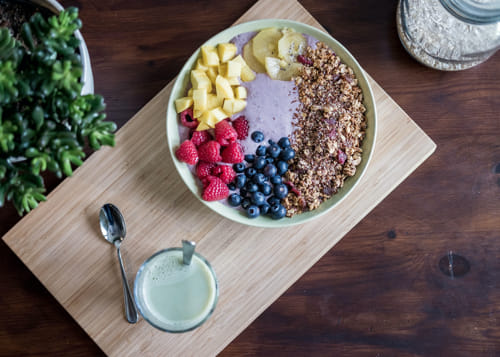Why is Gut Health Important?
Most of us believe that the role of our digestive system or our gut begins and ends with the conversion of the food we eat into energy. We rarely give a thought to our gut health. The gut, however, is a complex ecosystem that serves as our second brain. It is home to over 100 trillion bacteria. It plays a key role in critical functions of our body like our metabolism and immunity. There is a close connection between gut health and brain function as they are both connected by a network of chemicals, neurons and hormones.
The balance between good gut bacteria and harmful bacteria is very delicate. It needs to be maintained carefully for optimal cognitive functioning, digestion, immunity, metabolism, detoxification and skin health. Any imbalance between beneficial and harmful bacteria in the gut is known as dysbiosis. This can lead to chronic inflammation which in the long term can cause issues like diabetes, depression, acne, obesity, sleep disorders and cardiovascular disease.
Why do you need a gut microbiome test?
Improving gut health does not have to be difficult. In order to restore a healthy gut, we first need to have an idea of how good or bad it is. Taking a Bione Gut Microbiome test serves as a good starting point as it can give you a snapshot of your gut health.
Your MyGutMicrobiomeIndex (MGMI) score highlights how diverse your gut bacteria are. The lower your score, the greater the degree of imbalance in your gut. There is no cause for worry, though. This is a situation that can definitely be corrected. With expert help from the Bione team, you can tweak your food choices to improve your gut health. Bione specializes in wellness solutions that can spot illness well before it takes root so that you can enjoy optimal health.
Here are 10 easy steps you can take to improve gut health:
- Eliminate inflammation-causing foods from your diet: The first step is to reduce and if possible, remove foods that are most likely to cause inflammation. Foods that belong to this category include milk and milk products, caffeine, alcohol and processed sugars. Sugary foods not only cause inflammation but can also cause yeast to grow and thus disturb the delicate balance between beneficial bacteria and harmful bacteria in the gut. Minimizing the intake of such foods can cause some withdrawal symptoms. They will subside once your body adjusts to the changes. Drinking a lot of water at this stage can help with removing toxins.
- Switch to wholegrains from refined grains: Research has shown that wholegrains contain more fibre and carbohydrates like beta-glucan which cannot be digested. These carbohydrates pass through the small intestine or the gut in undigested form but once they pass into the colon they can promote the growth of good bacteria like lactobacilli, Bifidobacteria and Bacteroidetes. This contributes to a healthy microbiome in the gut. They also add bulk to food and reduce the risk of constipation, making digestion smoother. Wholegrains can increase the feeling of satiety, reduce inflammation and alleviate certain risk factors for heart disease. Examples of wholegrains include barley, oatmeal, quinoa, brown rice, bulgur, buckwheat and millets.
- Eat a lot of fermented foods having live microbes: It is a good idea to eat yoghurt as it has several bacterial species like Streptococcus thermophilus and probiotic bacterial strains like Bifidobacterium and Lactobacillus that help to balance the gut flora. Greater consumption of yoghurt has been linked to improved levels of insulin and blood glucose thus reducing the risk of diabetes. Other good fermented foods are cheeses made from raw milk, sauerkraut, soybean based products and kefir. Kefir is a sour milk drink that has five times as many microbes as yoghurt.
- Eat your vegetables:
 Mama was right when she insisted that you eat your veggies. Vegetables, especially the dark green leafy greens are excellent for gut health. A recent study found that leafy green vegetables had a sugar molecule called sulfoquinovose that is essential for feeding the good gut bacteria. This allows the beneficial bacteria to colonize the gut and prevents bad bacteria from taking over. Leafy greens like spinach and kale are also great sources of fibre, folate, vitamin C, and vitamin K. Vegetables like spinach, broccoli and asparagus are full of fibre. Though human beings do not have the capacity to digest fibre, the beneficial bacteria in our gut thrive on fibre. Hence, those who eat more vegetables are less likely to have a high count of bad bacteria in their gut. Scientists say that having leafy greens on a daily basis can reduce the risk of type 2 diabetes by 14%.
Mama was right when she insisted that you eat your veggies. Vegetables, especially the dark green leafy greens are excellent for gut health. A recent study found that leafy green vegetables had a sugar molecule called sulfoquinovose that is essential for feeding the good gut bacteria. This allows the beneficial bacteria to colonize the gut and prevents bad bacteria from taking over. Leafy greens like spinach and kale are also great sources of fibre, folate, vitamin C, and vitamin K. Vegetables like spinach, broccoli and asparagus are full of fibre. Though human beings do not have the capacity to digest fibre, the beneficial bacteria in our gut thrive on fibre. Hence, those who eat more vegetables are less likely to have a high count of bad bacteria in their gut. Scientists say that having leafy greens on a daily basis can reduce the risk of type 2 diabetes by 14%. - Eat foods that are rich in polyphenols: Polyphenols are a class of compounds that offer many health benefits like reduction in inflammation, blood pressure, cholesterol levels and oxidative stress. They can’t always be digested by human beings but are highly beneficial for good bacteria when they pass onto the colon. The best sources of polyphenols are foods like red wine, blueberries, green tea, almonds, cocoa, dark chocolate and broccoli. This is a handy excuse for eating chocolate as the polyphenols from cocoa can increase the numbers of good gut bacteria like lactobacilli and Bifidobacteria.
- Take good care of your teeth: It is important to brush and floss your teeth regularly. There is a close connection between your dental health and the health of your gut. Studies in Sweden and at Cornell University found that bacteria from the mouth can pass into the gut and can cause problems. So, ensure that you have regular check-ups and cleanings at the dentist and limit sugary foods that can damage your teeth.
- Reduce your stress levels: Greater levels of stress means higher levels of the stress hormone, cortisol. In the short-term, cortisol limits inflammation and thus boosts immunity. But in the long term, the body gets used to having too much cortisol in the blood and this paves the way for more inflammation. Stress also decreases the count of white blood cells which help the body to fight infection and thus affects immunity. Control stress levels by taking long walks, laughing more, spending time on meditation or having a pet.
- Do not take medicines unless they are absolutely essential: Many people have the habit of casually taking Paracetamol whenever they have a headache or a slight increase in temperature. We do not give the use of such over the counter medications a second thought. Common medicines like antacids and paracetamol can interfere with the working of good gut bacteria. Even antibiotics which are prescribed by doctors destroy both good and bad bacteria without differentiating between the two types. It can take many weeks for our gut to recover. According to the Centers for Disease Control and Prevention (CDC) in the United States, 30% of the antibiotics that doctors prescribe are unnecessary.
- Drink enough water: Studies have shown that drinking water has a beneficial effect on the mucosal lining of the intestines and on the balance between the good and bad bacteria in the gut. Water also serves as a natural lubricant that promotes intestinal motility and reduces constipation. This is a simple trick to attain a healthy gut microbiome.
- Get enough sleep and exercise: We underestimate how important adequate sleep is to achieve good gut health. Research carried out at the University of Tsukuba in Japan suggested that imbalance in the gut reduced serotonin levels and thus affected sleep. Having gut issues, in turn, messes with your sleep cycle and this turns into a vicious cycle. Ideally, we should get a minimum of 7-8 hours of uninterrupted sleep every night. Changing your diet to change the gut microbiome offers the potential to improve sleep thus benefiting overall health. Many studies have shown that the gut microbiomes of people who are physically active are more diverse and healthier. Hence, it might be a good idea to hit the gym to boost your gut health
Staying motivated to achieve our wellness goals can be challenging, but the task becomes easier with the right information and an action plan based on actionable insights. It is vital to take a keen interest in our gut health and do what we can to improve it. Take a Gut Microbiome test without any delay to ensure that your gut is always in good shape.




